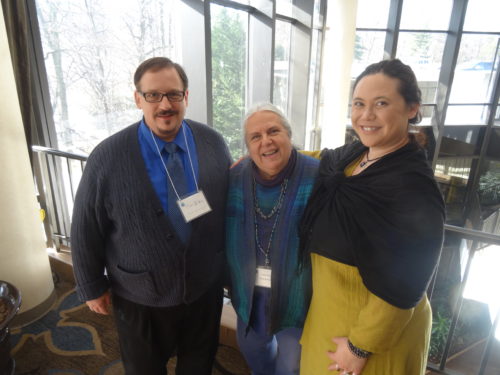BARNEVELD, Wis. — In January 2018, Paganism reached another milestone in equality for Pagan religious bodies. A Pagan institution has gained equal status in endorsing chaplains with that of the institutions of other more dominant religions. The Association of Professional Chaplains accepted Circle Sanctuary as an endorser Jan. 4, and the COMISS Network on Ministry in Specialized Settings accepted Circle Sanctuary on Jan. 7, joining the Sacred Well Congregation.
This step makes it possible for Pagans to expect culturally competent chaplaincy services.

Rev. Tim “Cern” Staker, Rev. Selena Fox, and Rev. Tiffany “Denora “ Andes [courtesy].
What do chaplains do?
The Wild Hunt spoke about what chaplains do, with two of their number: Rev. Tim “Cern” Staker, ordained by Circle Sanctuary, and Rev. Tiffany “Denora“ Andes, Chaplain Fellow, Second Year. Both work in secular hospitals. For the sake of brevity, this article will focus on chaplaincy work in secular hospitals. Chaplains also work in other institutions may face more complex and different issues, such as the military and prisons. They also work for organizations such as the Red Cross to assist victims of natural disasters and mass shootings.
Staker described a chaplain’s work as giving “spiritual and emotional support to people, often dislocated from their homes.” This dislocation may coincide with the most difficult time in their lives. Andes described chaplaincy as “the crossroad between social work, psychology, theology, and liturgy.”
He noted, “Chaplaincy is one area where women have traditionally had more opportunities to be clergy and to practice their ministry.” He noted that this did not show a female “preference” for chaplaincy. Instead, it resulted from a bias against linking women with congregations.
Chaplains typically work on interdisciplinary teams. Each member of the team educates the others about the customs and rules of specific traditions and religious beliefs, which can be critical in hospital care. For example, the rules for the Jehovah’s Witness prohibit blood transfusions.
Pluralism
Chaplains frequently work as clergy in government-funded medical institutions.This often raises issues concerning the separation of church and state. Professional chaplaincy has resolved these issues through promoting a pluralistic and interfaith perspective.
In a diverse society, patients could reflect an almost infinite number of spiritual traditions.The hospital budget requires a finite number of paid professional chaplains. Andes emphasized that chaplains need to have an “interfaith perspective.”
She emphasized, “Chaplaincy is not pastorship[sic]. To be a chaplain, you have to be able to appreciate that the spirit works, wherever it will.”
Demographics force chaplains from minority religious traditions to uphold this view. By definition, chaplains from minority spiritual traditions will see patients from other traditions. They have no choice. However, chaplains from dominant spiritual traditions are now finding themselves increasingly serving people from different traditions.
At the same time, there are some activities that do require chaplains to share spiritual traditions with their patients. For example, administration of Catholic sacraments requires an ordained Catholic priest. Emotional and spiritual support does not.
Discrimination
Still, discrimination happens. Staker reported that he had left prayer books in a chapel. Some of these prayer books reflected an earth-based spirituality. “A nurse said that she couldn’t pray in that chapel because those books were there.”
But Staker added, “It’s not just Pagans. I know Muslims have a difficult time too.“
Andes has worked as an “out” Pagan chaplain in the Bible Belt states of Kentucky and Tennessee. She has experienced subtle and nasty expressions of hostility from patients and colleagues. She has had patients kick her out of their room when they find out that she is a Pagan.
Staker described an incident at a children’s hospital. A nurse refused to work with a Buddhist chaplain, because he was not a Christian. Management had a talk with that nurse, explaining that chaplains are not all Christians. They also reminded the nurse that the hospital served patients other than Christians and that fact would have to be accepted.
How to request a Pagan chaplain
Those above accounts describe discrimination and harassment against non-Abrahamic chaplains, but Pagan patients can also experience forms of discrimination, harassment, and neglect. That is where the presence of Pagan chaplains can help.
Usually during intake, a worker will ask the patient about their spiritual tradition. At this point, the patient can self-identify as Pagan and request a Pagan chaplain. If the hospital lacks a Pagan chaplain, the facility can connect with local Pagan clergy.
If this patient is the first “out” Pagan to enter the hospital and request a Pagan chaplain, the hospital administrators may not know any local Pagan clergy. Some individuals have used resources like Witchvox to find local Pagan chaplains.
What do if discrimination occurs
If a hospital discriminates, Staker identified two levels of recourse. First, the patient can contact the hospital’s patient advocate, who is paid by the facility to represent those interests.
If that fails, the patient can then move on the next level. They can contact Lady Liberty League, a Pagan civil rights group. This league, a project of Circle Sanctuary, has a history of religious freedom and advocacy work. Circle Sanctuary already has a great deal of clout among national chaplaincy organizations prior to receiving their recent recognition.
Having the additional notoriety can only help Circle Sanctuary; connections with the Association of Professional Chaplains and the COMISS Network will allow the organization’s chaplains to have an easier time supporting both Pagans needing a chaplain, under any circumstance, and those people, like Andes and Staker, who are making the work a career.
The Wild Hunt is not responsible for links to external content.
To join a conversation on this post:
Visit our The Wild Hunt subreddit! Point your favorite browser to https://www.reddit.com/r/The_Wild_Hunt_News/, then click “JOIN”. Make sure to click the bell, too, to be notified of new articles posted to our subreddit.